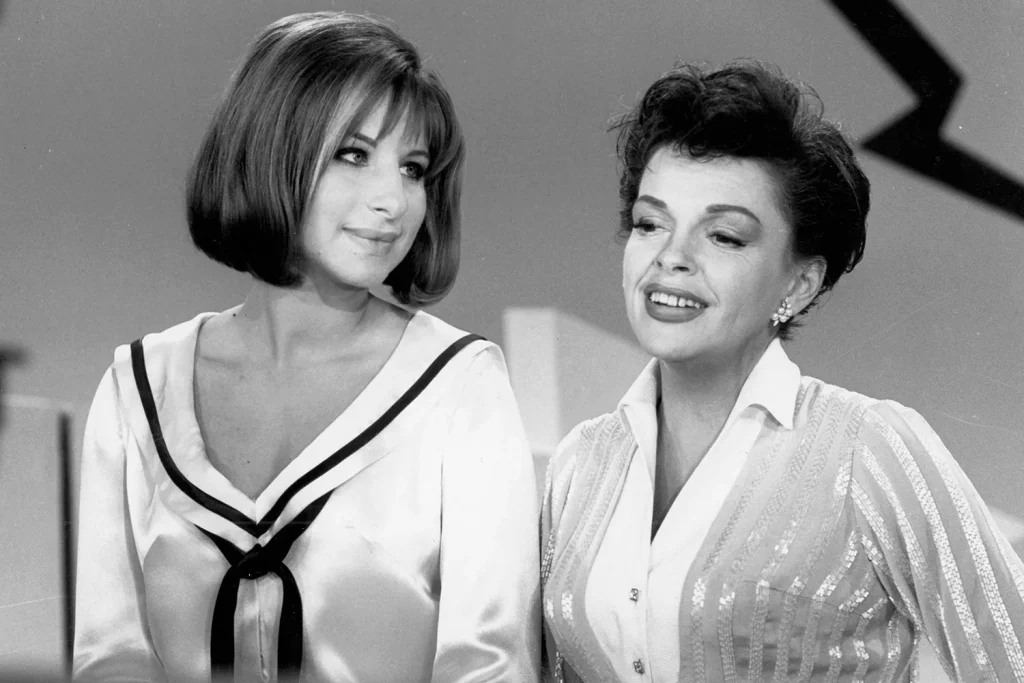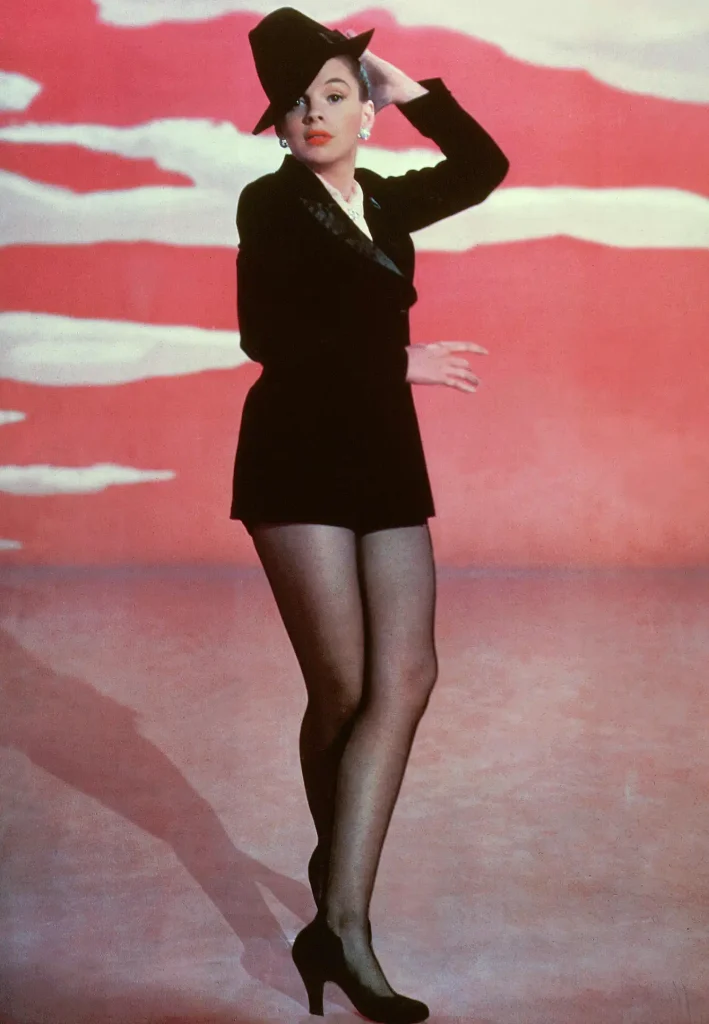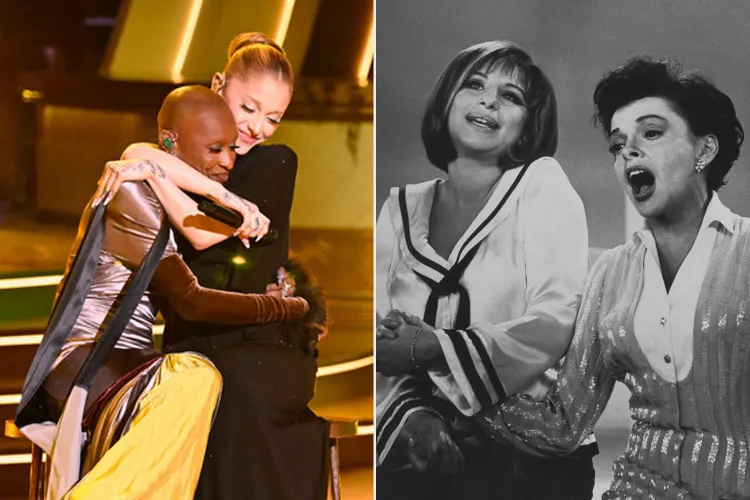Ariana Grande and Cynthia Erivo’s Surprise “Get Happy/Happy Days Are Here Again” Duet Honors Judy Garland and Barbra Streisand in a Powerful Tribute
It was a night made for history — and two of the world’s most powerful voices rose to the occasion. During NBC’s Wicked: One Wonderful Night special on November 6, Ariana Grande and Cynthia Erivo shocked fans with a surprise duet that felt like a once-in-a-generation moment. Their emotional rendition of “Get Happy/Happy Days Are Here Again” wasn’t just a showstopping performance — it was a reverent nod to one of the most legendary duets in entertainment history.

The surprise came near the end of the live broadcast, when Grande and Erivo, who star as Glinda and Elphaba in the upcoming Wicked movie, joined hands on stage under golden light. For a moment, the crowd hushed — and then the first notes began. Grande, soft-voiced but soaring, started with “Get Happy.” Erivo followed with “Happy Days Are Here Again,” their harmonies weaving together like silk. The audience was spellbound. Cameras captured tears, smiles, and stunned faces. When the final line rang out — “Happy days are here again” — the entire theater erupted into a standing ovation.
The choice of song wasn’t random. The duet has deep roots in music history, tracing back more than sixty years. Originally performed in 1963 by Judy Garland and a then-21-year-old Barbra Streisand on The Judy Garland Show, “Get Happy/Happy Days Are Here Again” became an instant classic — a meeting of two eras, two icons, two worlds colliding in perfect harmony. Garland sang the optimistic “Get Happy,” while Streisand countered with “Happy Days Are Here Again,” the songs overlapping in bittersweet euphoria. It was one of the most unforgettable television moments of the 20th century.
On Thursday night, Ariana and Cynthia recreated that electricity for a new generation. For many in the audience, it was a breathtaking blend of nostalgia and innovation. Both singers embody what Garland and Streisand represented in their time — the rare combination of vulnerability, precision, and power. Erivo’s voice thundered through the theater, rich and soulful. Grande, ethereal but controlled, matched her in tone and emotion. Together, they felt unstoppable — like two forces meant to collide.
The tribute also carried a symbolic weight. Just as Garland and Streisand passed the torch between generations of artists, Erivo and Grande’s performance felt like a continuation of that legacy. It was a statement: the spirit of musical theater, of sisterhood, of artistry, endures. The fact that they performed it during a Wicked special made it even more poignant — a story centered on two women whose friendship defies expectation, jealousy, and time.

Behind the scenes, the performance was reportedly kept secret until the night of the broadcast. According to production insiders, only a handful of crew members knew the medley was even part of the show. The decision to include it was made just days before taping, inspired by the parallels between the two duets. “It felt right,” one producer said. “It felt like a love letter to the women who came before.”
The crowd’s reaction confirmed it. When the pair finished their first run, the applause refused to stop. Grande smiled through tears, turning to Erivo as they embraced tightly. Then, in a spontaneous moment of joy, Grande asked the audience, “Can we do it one more time?” The theater erupted. They sang it again — this time louder, freer, bolder. It wasn’t just a performance anymore; it was a celebration.
Social media exploded seconds after the broadcast ended. Within minutes, clips flooded TikTok, Instagram, and X (formerly Twitter). Fans called it “transcendent,” “historic,” and “a full-circle moment for music lovers.” Many praised how respectfully the duo honored Garland and Streisand while making the piece their own. Others pointed out the cultural symmetry — that two women, one Black and one white, representing the modern faces of musical cinema, had reimagined a duet born from another groundbreaking female partnership decades earlier.
Cynthia Erivo, already a Tony and Grammy winner, has long spoken about her admiration for both Garland and Streisand. “They were fearless,” she once said in an interview. “They understood emotion in its rawest form.” Ariana Grande, whose career has spanned from Broadway beginnings to global pop superstardom, has also credited Streisand as one of her vocal idols. Their collaboration, then, felt almost destined — a bridge between eras and styles, rooted in respect.
The medley’s revival also highlighted a deeper message. “Get Happy” was written in 1930 during the Great Depression by Harold Arlen and Ted Koehler, while “Happy Days Are Here Again,” composed by Milton Ager and Jack Yellen, became an anthem of hope for Americans enduring hardship. Together, they’ve long symbolized resilience — a reminder that joy, no matter how fleeting, always returns. In the midst of today’s uncertain world, the song’s message of renewed happiness hit harder than ever.

Beyond its musical brilliance, the moment also humanized two of Hollywood’s biggest stars. During rehearsals, witnesses described a genuine camaraderie between Erivo and Grande — laughter, hugs, shared nervous energy. When they stepped on stage, that connection radiated. Their embrace after the final note wasn’t scripted; it was real. It was the kind of authenticity that can’t be rehearsed, the kind that turns a good performance into a timeless one.
Industry insiders are already calling it one of the standout musical television moments of the decade. For Wicked: One Wonderful Night, which featured performances by Ariana, Cynthia, Michelle Yeoh, and other members of the film’s ensemble, the duet was a natural finale — something both rooted in the past and electrified by the present. Critics at Entertainment Weekly called it “pure magic,” while People described it as “a masterclass in reverence and reinvention.”
As for Ariana and Cynthia, both stars appeared humbled by the reaction. Hours after the show, Grande shared a simple Instagram story: “Forever grateful. Forever inspired. Thank you, Judy and Barbra.” Erivo reposted it with a heart emoji and the caption: “Our happy days are here again.”
What makes the performance so unforgettable isn’t just the technical perfection — it’s the emotional clarity. There’s an unspoken understanding between the two women, a shared sense of purpose that transcends the notes. They weren’t competing for spotlight; they were sharing it. That, in itself, is the magic of true artistry.
In a world where entertainment often prizes spectacle over soul, this moment felt rare — two voices, one legacy, and a bridge of music connecting generations. Much like Garland and Streisand before them, Ariana Grande and Cynthia Erivo didn’t just perform a duet. They created an event, one that will live on as part of both Wicked’s legacy and music history at large.
When the lights dimmed and the credits rolled, one truth lingered in the air: some songs don’t just get sung — they get reborn. And thanks to Ariana Grande and Cynthia Erivo, “Happy Days” are, indeed, here again.


